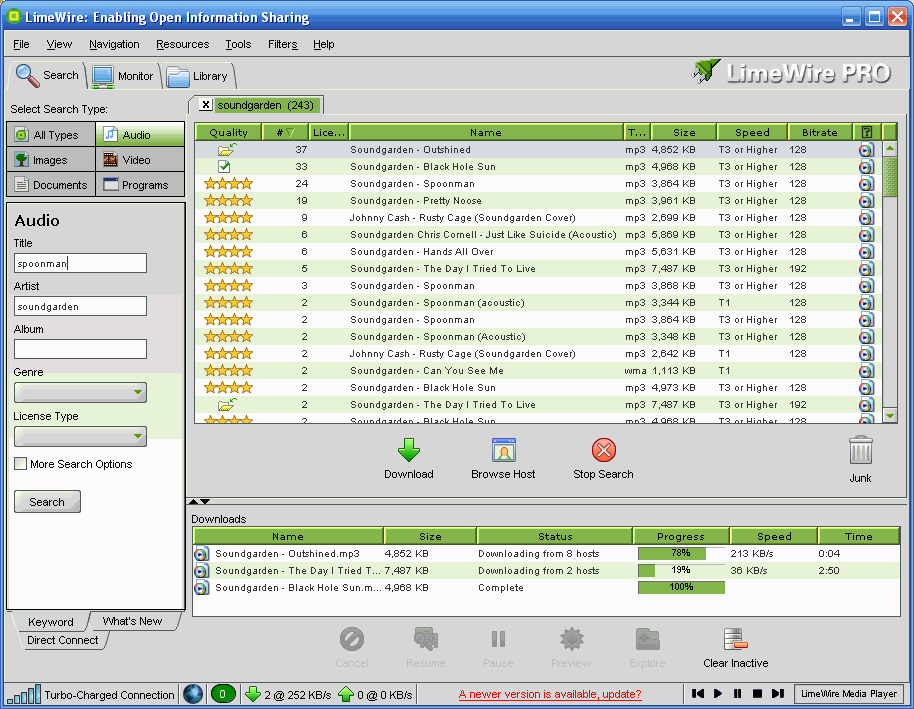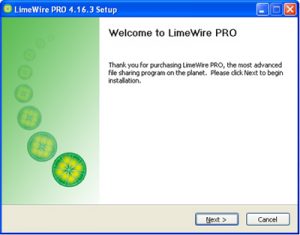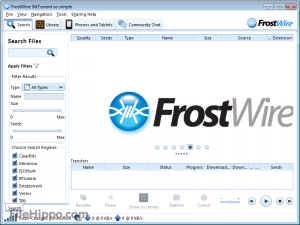The History of LimeWire – A P2P File Sharing Software of the 2000’s
by Dave Fox
If you were hip and happenin' with technology in the 2000s, then you probably used LimeWire at some point to download music onto your MP3 or your iPod shuffle. It was the heir to the throne of decentralized P2P file sharing that was once ruled by Napster, the platform which came before it.
As a kid, I learned how to use LimeWire from my older brother. Free music - it was great! It was the first site for downloading music that I ever learned how to use. I downloaded loads of songs onto my iPod Nano: Britney Spears, Avril Lavigne… all the 2000s classics. Of course, sometimes you would download a song and when you went to listen to it, there was no sound, or else it was a completely different song than what you wanted. But all in all, it was a really useful software for many people.
Contents
- What is / was LimeWire?
- How Does LimeWire Work ?
- Is LimeWaire Limited to Downloads Only ?
- How to Use LimeWire to Find Music, Movies, and Software
- The Benefits of Using Limewire Over Other File-Sharing Networks
- Different Versions of Limewire
- The Court's Ruling Against LimeWire
- LimeWire Pirate Edition and Shut Down
- Forks from LimeWire
- How to Stay Safe While Using Limewire
- Keep Your Personal Information Safe
- Stay Away From Files Claiming to be Music or Movies
- Be Careful When Downloading Files with Undefined Extensions
- Don't Download Files with Undefined Extensions if You're Using Windows XP
- Only Use Download Managers to Download Files that You Know are Safe
- Never Give Out Your Password to Anyone
- Keep Windows Updated
- Alternatives to Limewire for Finding Files Online
- Conclusion for LimeWire
What is / was LimeWire?

LimeWire was a free platform for peer-to-peer file sharing that was operable on Windows, macOS, Solaris, and Linux. It was written in the Java programming language and was first released in May of 2000 by its creator, Mark Gorton. It used the Gnutella network.

To download music, you simply had to search the name of the song you wanted. A giant list of options would appear, and from them, you chose the "least sketchy" looking file. There were quality ratings out of 5 stars next to the songs which helped with downloading the best file. Then you would simply choose the song and download it. And voila! Music for free.
Here's a screenshot of how Limewire generally looked. Ah, the memories of illegal downloading

How Does LimeWire Work ?
There are several advancements in technology that have been made within the last decade. One of which being file sharing through P2P software. There are multiple different programs available, but one stands out among them all for its extreme popularity and use - LimeWire.
LimeWire is a free download. It does not come with any spy-ware, is very user-friendly, and is available for both Windows and Mac Operating Systems.
The way LimeWire works is by utilizing something called Gnutella, an open source P2P file sharing program. This allows any person to share files in the same fashion as many other file sharing programs - through direct transfer between two parties. When you install LimeWire, you give it a location to save the files that will be requested and downloaded. This is usually your hard drive, but can also be any other mapped network drives. The Gnutella P2P file sharing protocol allows LimeWire to share all of your files with anyone else on the internet. To do this, LimeWire creates a list of all of the files that you have and sends this file out to other users, letting them know what you're sharing. When another user searches for a file, it checks your list and then downloads it from you if it's not already on their system.
This process allows LimeWire to move very quickly. For example, when I type the name of an artist into the search line (such as "doors") it will immediately bring up a list of all of their albums, what other users are sharing that particular album, and how many people are currently downloading that file.
Is LimeWaire Limited to Downloads Only ?
LimeWire is not limited to just downloads. It also allows you to upload any files you may want available for others. This comes in handy if someone were looking for something specific, like a certain text document or sound clip, but you don't have it downloaded onto your computer yet. You can simply upload the file via LimeWire, tell them what it is they're looking for, and then they can download it directly from you instead of finding an entirely different version somewhere else on the internet.
There are many different types of files that LimeWire can share, including MP3s, movies, software, pictures and more. This makes it an extremely versatile piece of software. There are also advanced options available to you once you're inside the program, such as prioritizing uploads for faster downloads or setting certain preferences according to your own personal needs.
LimeWire is not just limited to simply file sharing, either. It incorporates its very own version of a chat room into the mix, which comes in quite handy when trying to find something specific. You can simply ask other users if they have what you're looking for and then wait until someone replies with their download or email address (if they do happen to have what you need).
How to Use LimeWire to Find Music, Movies, and Software
The site is shut down but this ishow to find music, movies and software on LimeWire before:
- Open your web browser and go to: www.limewire.com
- On the left hand side of the screen you will see a list of icons, click on the one that says "Files"
- Find the file type you want (music, movie, or software) and double click it to start downloading
- For example, if you wanted to download the album "The Heist" by Macklemore & Ryan Lewis, you would click on 'music' to start your search. Then, type in the name of artist or the name of the song that you are looking for. You can also use various other terms to find what you are looking for, such as 'album' or 'free'.
- After you have found what you are looking for, double click on the file to start the download process. Wait for it to finish downloading and enjoy! For this example I searched for "the heist macklemore ryan lewis" and then clicked on one of their albums and downloaded it.
The Benefits of Using Limewire Over Other File-Sharing Networks
MP3 music files are usually around 3 megabytes in size. So you want to send your friend a song but you only have an old 56k dial-up modem, which will take hours just for the download of one song. With other file sharing networks, it is likely that they will not even let you download at 56k. Limewire, however, is very lenient about file sharing. They let you download at 56k because it is possible that someone else may be downloading something that they want while you are attempting to download something that you want. So here are some benefits of using Limewire over other file-sharing networks.
- You can get almost any song in a matter of minutes instead of hours.
- You can download songs from different computers at the same time, meaning you can get 2 or 3 songs at a time.
- Limewire is much faster than other networks because it contains no advertisements and its servers are not always busy.
- There are no limits of how many songs you can download.
- You get direct downloads instead of having to download an.exe file or using a torrent client, which is unreliable and often times illegal.
- Limewire's search engine is very reliable compared to other file sharing networks. At most, it will only give you semi-premium results (we'll explain below).
- Finding rare music is relatively easy on Limewire because it has many different sources to search from.
- It has no virus or malware that will come along with your download, unlike other file sharing programs.
- You can delete songs off of your hard drive once you have downloaded them instead of having to keep the file and filling up your hard drive.
- Limewire is very easy to use and it has a clean interface.
- If you want to download the most recent releases, Limewire will let you do that because their filters are better than other networks'. Other networks' search engines can be unreliable and can send you to a bad link.
- Limewire's community is less likely to send you to a bad link than other file sharing communities because it has very few advertisements and the ads that they do have are not as buggy as other networks' ads.
Different Versions of Limewire
Users could choose the basic, free version or purchase an improved version. The enhanced version, LimeWire PRO, which supposedly had faster download rates and more accurate search results, was sold for $21.95 for 6 months of updates, or $34.95 for a year of updates.

Throughout the decade, LimeWire released many updated versions. LimeWire 4.2 added the feature of firewall-to-firewall sharing, and LimeWire 5.0 added an instant messenger that allowed users to chat and to share files with individuals or with groups of friends.
In version 5.5.1, anyone using the pro version had to input an activation key; this prevented the illegal downloading of the pro version. However, people have still found ways to sneak around this security feature. Bittersweet irony right there, since Limewire itself is meant to steal stuff, essentially, which most people called "sharing". Stealing, sharing - what's the difference?!
The Court's Ruling Against LimeWire

In 2010, it was ruled in court that LimeWire and Mark Gorton were guilty of copyright infringement and unfair competition. LimeWire was made to shut down on October 26th, 2010. New versions of the software were discontinued; however, older versions can not be disabled unless the user updates to a new version.
There were other problems brought about by LimeWire, particularly with illegal porn, which forced lawyers back in the day to deal with cases they might not otherwise see. Listen to what this guy has to say about the trouble it caused.
LimeWire Pirate Edition and Shut Down

In November of 2010, a group of developers called the "Secret Dev Team" created LimeWire Pirate Edition in an attempt to keep the program up and running.
This Pirate Edition has software based on the LimeWire 5.6 version, and includes the features of LimeWire PRO.
However, the LimeWire team was accused of having a hand in the development of the Pirate Edition, and so they acted to shut the Pirate Edition down. A staff member from LimeWire stated, "LimeWire is not behind these efforts. LimeWire is complying with the Court's October 26, 2010 injunction".
In 2011, the RIAA decided to sue LimeWire for the damages they had caused. There was a trial in May 2011 to decide on the amount of money that LimeWire owed to 13 record companies due to the large amount of copyrighted songs on the site and the number of times they had been downloaded.
In the end, Gorton settled the case by paying the record companies $105 million.
Here's another young dude's take on the LimeWire closure back from when it happened.
Forks from LimeWire
Several forks were created from LimeWire as well, LimeWire Pirate Edition being one of them. There was also FrostWire, which was created in 2004 by members of the LimeWire open source community, as well as WireShare.

How to Stay Safe While Using Limewire
Limewire is one of the most popular programs for getting music from "the cloud". Unfortunately, Limewire can be dangerous in more ways than one. We will show you how to stay safe while using Limewire, or any other program like it. These are safety tips that are common sense, but most people don't follow the rules.
1. Keep Your Personal Information Safe
The first step is to make sure you keep your personal information safe. Under no circumstances should you give out your name, address, telephone number, email, password, or other information to someone who claims to be a representative from Limewire. This is a scam especially common on Skype. You should also keep your credit card and bank account numbers safe from hackers, as well as any other information that would be harmful if it were obtained by someone else.
2. Stay Away From Files Claiming to be Music or Movies
The second step is to watch what you download. Never open a file claiming to be music unless you have personally downloaded it from iTunes, Amazon, or some other site where you know for sure that the files are safe. Also stay away from downloading any movies, no matter how good it looks; chances are all you will get is a blank file.
3. Be Careful When Downloading Files with Undefined Extensions
The third step is to be careful what you download, specifically when the file extensions are undefined (a period followed by random letters and numbers). If you know that the file isn't harmful, then go ahead and download it; but otherwise stay away from it.
4. Don't Download Files with Undefined Extensions if You're Using Windows XP
The fourth step is to be especially careful when using Windows XP, as this operating system has a vulnerability that allows the downloading of files with undefined extensions. If an unknown file gets downloaded and you have never heard of it or know what it is, then delete it; otherwise your computer could get hacked.
5. Only Use Download Managers to Download Files that You Know are Safe
The fifth step is to only use download managers for files that you know are safe, like Google Chrome or another browser with this feature built in (such as Internet Explorer 9). If you do this, then you have a much smaller chance of downloading something harmful, if not zero.
6. Never Give Out Your Password to Anyone
The sixth step is to never give out your password to anyone unless you know that they are legitimate. If someone claiming to be from Limewire asks for your password, then ignore them; they will try and get you to download a file with an undefined extension and in the process they will get your password. Only give your password out if you authorize it, and be sure to keep track of who has access to it.
7. Keep Windows Updated
The final step is keeping Windows updated. This ensures that your system is safe from any vulnerabilities that hackers can take advantage of, such as the one in Windows XP. These safety tips will help you stay safe while using Limewire and downloading files from the cloud.
Alternatives to Limewire for Finding Files Online
Limewire is a free and popular peer-to-peer file sharing program that allows people to find and download music, software, videos, and other electronic files. However, the network of users trading files with Limewire has come under fire from media companies and recording artists who believe they are losing money because of illegal file sharing on Limewire.
As a result, the developers of Limewire have announced that they will be shutting down the peer-to-peer file sharing side of their program in an effort to appease media and music companies. However, there are still many other popular peer-to-peer file sharing programs available online for people who want to share files with each other.
Here are some Limewire alternatives:
- Azureus
- Vuze
- Bitcomet
- Bearshare
- DC++
- Kazaa
- Shareaza
- utorrent
Of course, if you're going to use a peer-to-peer file sharing program, it's a good idea to find files that have been uploaded by people who have permission to share them. A number of companies have created search engines for finding files online via peer-to-peer networks such as Utorrent, eDonkey and BitTorrent, so you can find the latest popular movies, music and software this way.
If you're using a peer-to-peer file sharing program on your computer or mobile device, remember to use it responsibly. While file sharing programs can be legal when used properly, they are often abused by people who illegally download and upload copyrighted material without permission.
Most peer-to-peer file sharing networks allow you to block connections with users that you don't know or trust, so if you're using this type of program, make sure you configure your settings for maximum privacy.
Also, keep in mind that using peer-to-peer file sharing networks might violate the terms of service on many Internet service providers. If you don't want to risk losing your Internet connection, only use these programs when you're not connected to an ISP network.
Conclusion for LimeWire
This is the abridged history of LimeWire. It was an essential tool of the 2000's decade for downloading and sharing music for free, but in the end, was shut down due to legal infringements - typical of a lot of file sharing platforms. Kids love 'em, the music business hates 'em.
BONUS:
Here's a not-so-quick video to familiarize you with the look and feel of Limewire, just so you can get right into that heart-warming Limewire feeling with me! BTW, this isn't my video, it's just a video showing a guy using Limewire.
 |
 |
 |
 |

About Dave Fox
Recorder of many songs, haver of many albums. Dave (AKA Young Coconut) has been making music for the past twenty years or so, of varying genres and degrees of quality, to the dismay of listeners and algorithms everywhere. He’s also in the Suburban Bicycle Gang with Jerry Grey.
Dave has a keen interest in studying all aspects of music history, especially experimental / genres like jazz, krautrock, drum n’ bass, and no wave.
Here’s his Spotify: https://open.spotify.com/artist/1v3iPVEXzurahTI2Tm4Tpm
Leave a Reply
Check for FREE Gifts. Or latest free acoustic guitars from our shop.
Remove Ad block to reveal all the rewards. Once done, hit a button below
 |
 |
 |
 |